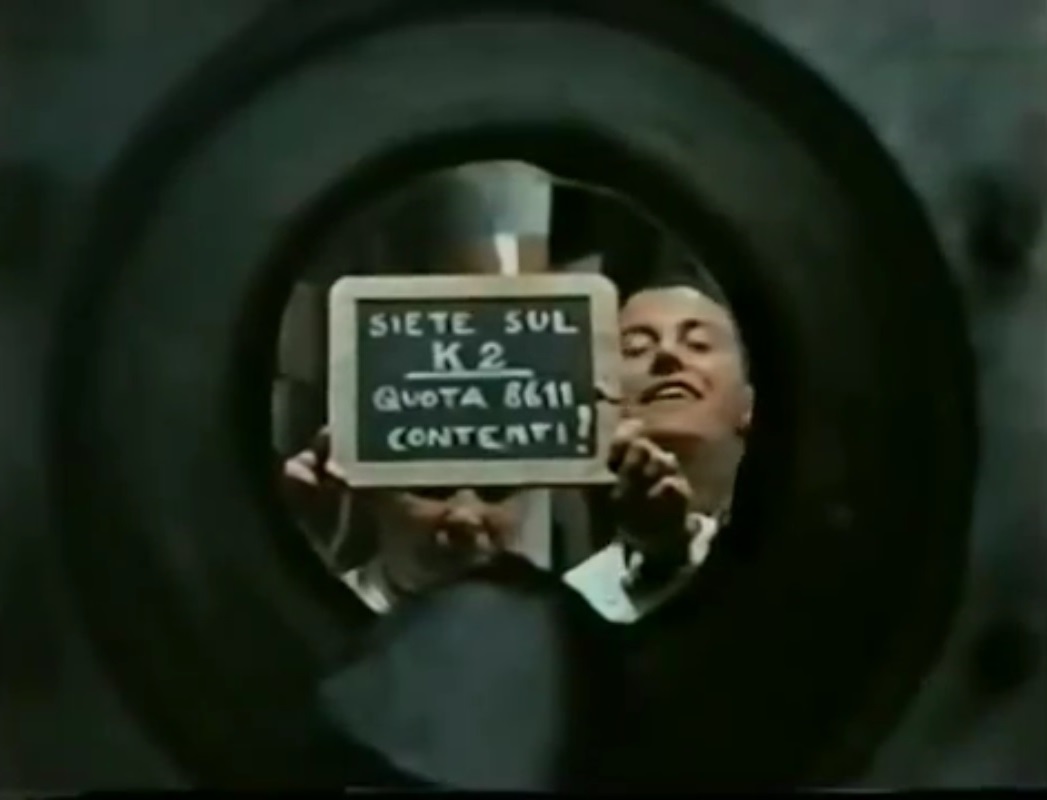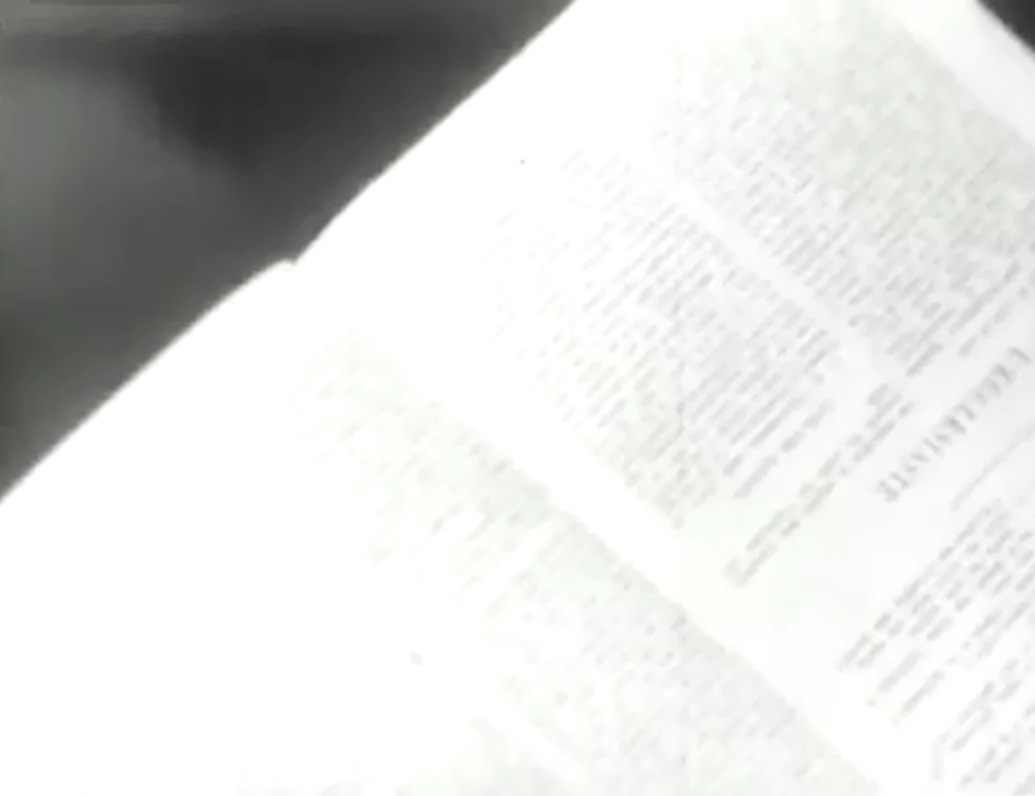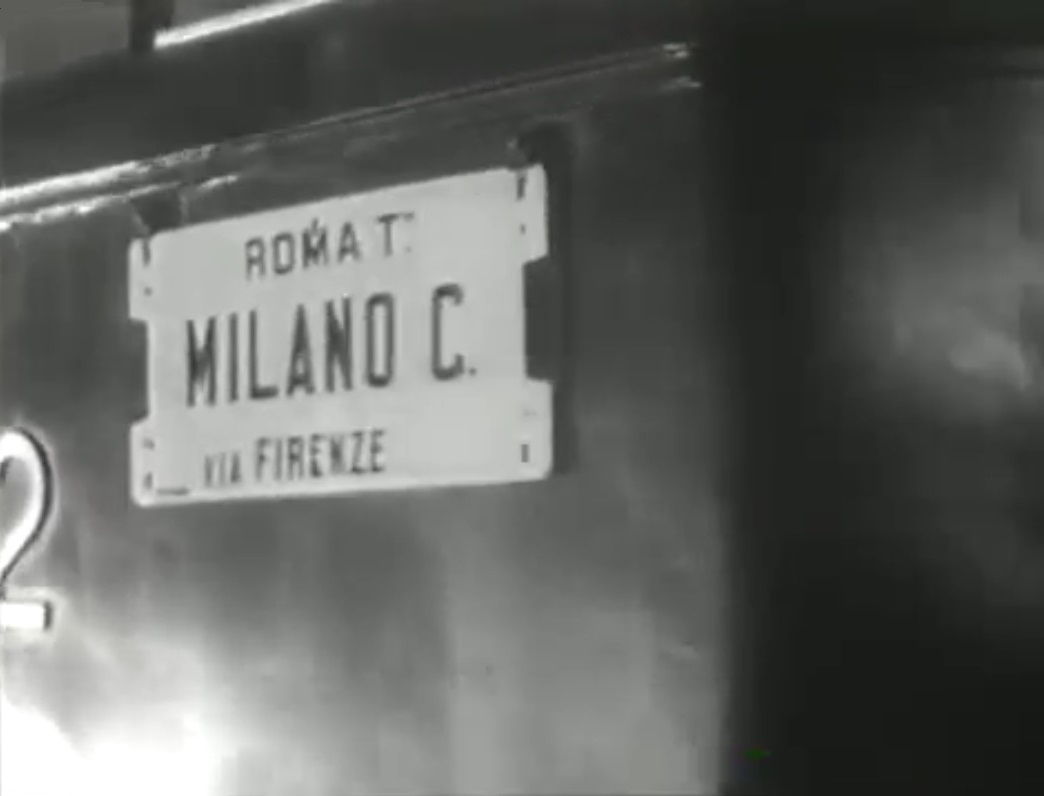Italia K2

A very pretty, dangerous
mountain, fatal before. Scientific preparations
include a high-altitude chamber, geological briefings, physical testing, a general analysis.
The 1954 Italian
expedition led by Prof. Ardito Desio
of the Club Alpino Italiano
(“e cosi desio me mena”, as Holbein
has it from Petrarch).
A stravaging schoolboy on the Alps to begin with, helped out
of a pickle. Dmytryk evidently recalls it here and there
in The Mountain.
Baldi has an inexhaustible genius for the beauty of
these mountains on the long approach in pictures that are confessed to give
little sense of the sublime vastness (cp. The
Conquest of Everest)... well over halfway through the film and more than halfway
up K2, the ascent has not yet begun in earnest, base camp has prosciutto in
cold storage, a W.C., an electric generator, a post office and a small shrine,
the men sport like Scott’s party amongst the penguins (vd. Charles Frend). The steady, calm,
businesslike climb is immediately met by a wintry blast as reported on the Riviera,
death of an Alpinist. The frosty vertical ascent, a
sunny interval, step by step with guide ropes. Ninth
camp, final ascent, view from the summit. Church bells
rejoicing in the Alps, the seared faces of the two final climbers.
Night Train to Milan

A scattered
handful of passengers, “it’s not true, there’s always plenty of empty space on trains
going Christmas Eve! Well, it does happen sometimes,
but now and again, you know, during Easter, although it’s just the same
during Easter.” A certain gift, a resurrection,
a certain Schneider, né
Bauer.
Out of Rome, with
a stop at Florence a little before midnight, Santa Claus is there on the platform
with his sack on his back, pacing...
Il criminale, to begin with. “Do
you always read books upside down?” The Butcher of Belsen, next stop Bologna... a
postwar discussion... the grass widow of an eager executive, she digs the guy
(there’s a jazz quartet rehearsing in one of the empty or nearly empty
cars, en route to an impromptu date),
“what would have happened to me,
if I’d been in your concentration camp?”
“Not what
you’re thinking, anyway.” Standoff at Modena... on to Milan, “hunted like the Jews!”
A very agile,
very able New York dub of Baldi hitting on all
cylinders.

Giacobbe, l’uomo
che lottò con dio
The vigor and
brilliance of his subsequent films are not in evidence until Jacob is at the
well, rather Baldi finds drama in the image per se,
and let it be said that Huston appears to have drawn on the Abraham section for
The Bible, a fitting homage.
Abraham and Lot
part ways, the angel appears, sacrifice of Isaac.
A novel in
pictures, maid brings food to somber patriarch at rich table, boy eats a piece
of fruit contentedly, stands beside mother, looking at her, she drinks from a
goblet, he goes away (Hagar, Abraham, Ishmael, Sarah).
Blake is called
upon for an image of Isaac on the pyre, Abraham stretched upon him to kiss his
eyes, with a repeat after the dismissal. Similarly,
Rebecca’s formative hands clasp and clench below her bosom as she speaks
to Jacob of the prophecy, they rise to cover her eyes as Abraham confers a
curse to the cursers, a blessing to the blessers.
The fate of
Lot’s wife is elided as narration in order to effect a comparison with
Sarah’s laugh.
A Salvador Dali
landscape accompanies Jacob’s farewell from Esau, and recurs after he
wrestles the angel.
Festive colors, antique carts, oxen. The dubbed version is an excellent example of the
New York school. Laban has a
sneer from the silents in one close-up.
The screenplay is
very finely worked out, not overelaborated. The Herzog image at the return over Jordan, an ox swimming
in close-up. Jacob rising into frame, with smoke and
light and the river behind him bearing a raft, to pray before encountering
Esau, answered by a laugh. The light dawns in his eyes
after the wrestling match.
Esau and his men
on horseback like Huns. Jacob’s train winding on
past the Jordan, the camera tilts up to the blue sky streaked with clouds.
“Laban,” says Jacob, the man who fought with God,
“let it be as you wish, because this is the will of the Lord.” His uncle shrugs with a smile, “mmmmmm.”
Laban’s herds have doubled, “you have been able to
share in the blessings of God Almighty,” Jacob tells him. “I admit it,” says Laban
freely, “I admit it.”
Saul e David
The drama of the
image in Jacob, the Man Who Fought with God is now the drama of
character from Amalek to Gilboa,
and once again Huston takes a note for The Bible, condensing rather than
embellishing the worldly king of virtues pertaining to his station but as such
fixed with a tragic flaw in the purposes of Jehovah, just adumbrated in the
study of Isaac learning his descent by reciting the names on his father’s
staff, before the Sacrifice is required and annulled.
Norman Wooland played Horatio to Olivier’s Hamlet, and Catesby to his Richard III. Here,
he has the lead in a highly Shakespearean Tragedy of King Saul. This is coupled formally with a view of David derived from
David Lean’s Lawrence of Arabia, hence he is blond. Gianni Garko is an actor
entirely unknown in the United Sates except by dint of his resemblance to
Buster Crabbe as Tarzan, it might be.
Ahimelech and forty white-robed priests are put to death in
the open courtyard of the king’s palace. No man
of Israel will do it, but Doeg the Edomite slays the high priest himself, and one by one the
bowmen follow suit, at Saul’s command. When Ahimelech is hit by the arrow, Saul roars with pain,
everything that passes his lips after his deconsecration
is a pronouncement against himself.
After the battle
in which Saul is slain, David’s speech, “how are the mighty
fallen,” is spoken off-camera over a view of the disaster.
I Grandi condottieri
The
English-dubbed version is subtitled “a film by Marcello Baldi”, with a credit reading “directed by
Francisco Perez Dolz”. It
seems incredible that such a film should remain in obscurity for so long that
its authorship is in doubt, but that is what appears to be the case.
The Great
Leaders is equally divided between
Gideon and Samson, which gives their stories as formal epitomes of the Old
Testament and New. The inspired version of Gideon has
him a wily peasant, a Cincinnatus of sorts who leaves
the plow at the behest of the angel of the Lord, slays the Midianites,
and retreats back to his farm, or so his press package would read. Instrumentality is his gift, like an ass, along with a
little cunning. Ivo Garrani’s portrayal of him is a rich, comic
experience. He’s an older country cousin of the
Navy man played by William Holden in Lean’s The Bridge on the River
Kwai, and there is an influence of Lawrence of Arabia on the formal
layout of the piece, one should say. The stunning
direction throughout is brought to acute points in the pre-dawn and sunup
tests, and the night assault with pitchers and torches makes a grand sight
rigorously filmed. Fernando Rey’s
urbane study of an angel is very remarkable for its droll savvy and easy
comedy.
Samson is, of
course, a high comic figure in his own right. The
screenplay hews more closely to the text even than with Gideon. The vision of a Gaza harlot is like a fresco,
Rosalba Neri’s
Delilah is a flickering portrayal of woman’s wiles and will and mind and
everything else, a complete repertoire, an exquisite performance.
Anton Geesink is a Michelangelesque
Samson, who expresses in a glance the joy of slaying Philistines with the
jawbone of an ass. He’s as natural a study as
everything else in this brilliant, flawless picture.
The temple of
Dagon is a fine structure, the camera tilts up from the god’s fishtailed
statue (earlier seen horizontal before installation) and shows all five stories
full of Philistines around the central, open atrium. Its
destruction is a mighty effect, and coming at the end of the film echoes the
angel’s first behest to Gideon, that he should destroy the altar of Baal,
etc.
This is a classic
work of the Italian New Wave which The Film Encyclopedia of Ephraim Katz
did not avow to exist, even, not in its first edition anyway, and not that it
matters.
What matters is
Samson disappearing under the city gates, which rise and go out of the city and
into the night.